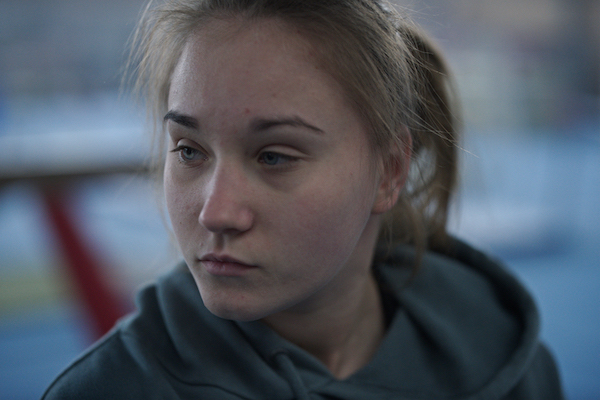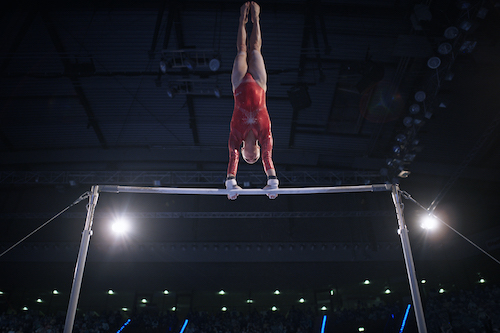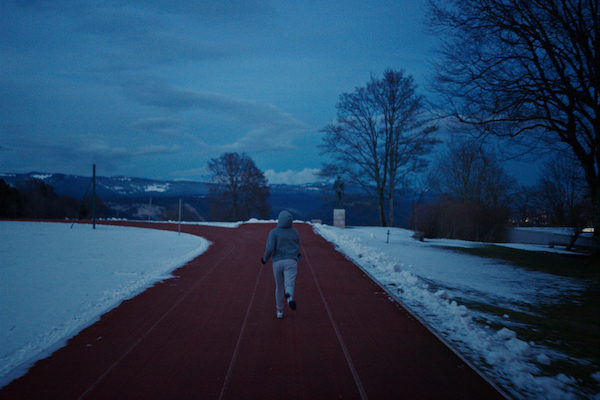Olga: An Athlete Torn Between Countries and Allegiances

Olga, a timely film directed and co-written by Elie Grappe, uses the 2014 Euro-Maidan Revolution in Ukraine as the setting for a coming-of-age story about a teenage gymnast who is torn between countries and allegiances. Written in 2016 and completed in early 2021, the film predates the recent Russian invasion, effectively shedding light on events that led up to the current war. Mainly, though, it is a tension-filled portrait of the title gymnast (portrayed with sensitivity by Anastasia Budyashkina, former member of the Ukraine national reserve team), who at age 15 relocates from Kiiv to Switzerland to train for the European Championship with the Swiss national team.
The move is is not easy for Olga, whose late father was Swiss, but it is for her own safety. In an early scene, she and her mother, Ilona (Tanya Mikhina)—a journalist who is investigating the corrupt administration of then President Viktor Yanukovych—are targets of pro-government violence. Despite concern for her mother and ambivalence about leaving home, Olga moves to the pristine alpine countryside to live with her grandfather and other paternal relatives.
In order to compete with the Swiss team, Olga must become a citizen; since Ukraine doesn’t permit joint citizenship, she is forced to choose between the only home she’s known and the opportunity to pursue her Olympic dreams. This is another tough decision, complicated by the wide culture and language gap between Olga and her Swiss teammates, who cannot imagine what she is going through. Olga often connects via FaceTime with her best friend, Sasha (Sabrina Rubtsova, also from Ukraine’s reserve team), who enthuses about the escalating protests by Ukrainian citizens.

Meanwhile, there’s the actual training. Grappe shows many scenes of tough workouts in real gymnastic facilities. (The trainers and some of the athletes are members of the Swiss national team.) Determined to master one particular move on the uneven bars, Olga trains hard and repeatedly, despite warnings from her coach. Her introverted, steely-eyed determination is palpable, earning her the nickname “robot.” Olga is clearly experiencing tremendous emotional turmoil as the revolution escalates. On her phone, she watches alternately rousing and terrifying scenes of protestors in Kiiv raising their voices in song and getting beaten by police, her serenely beautiful Swiss surroundings shown in stark contrast with the chaos of Maidan (Independence Square).
Though initially rebellious, getting into physical altercations with her Swiss teammates and disobeying her coach, Olga gradually becomes part of the team as her relentless training pays off. She finally befriends a teammate and they goof off like normal teens, a much-needed outlet for Olga’s emotions. Still, life is tough–in addition to everything else, she must defend her mother’s actions and the Ukrainian uprising in general to her Swiss relatives.

Things come to a head the night before the European Championship, as Olga receives some grim news. The film doesn’t flinch, nor does Olga in competition, but it’s clear she has to make a major decision about her future.
Though sometimes a bit meandering, Grappe’s film is a sobering and powerful portrait of a life under unimaginable stress. It’s a reminder of the many dislocated Ukrainians (and other refugees of war) who grapple with guilt and worry for choosing survival over the dangers of home. We’ve seen similar stories about real-life dancers, athletes, and others who pay a steep price for the privilege of safely continuing their careers. Theirs is a terrible burden that no one should have to shoulder, let alone a very young person.
Olga opens on Friday, June 24, at the Quad in New York City.
—Marina Zogbi

